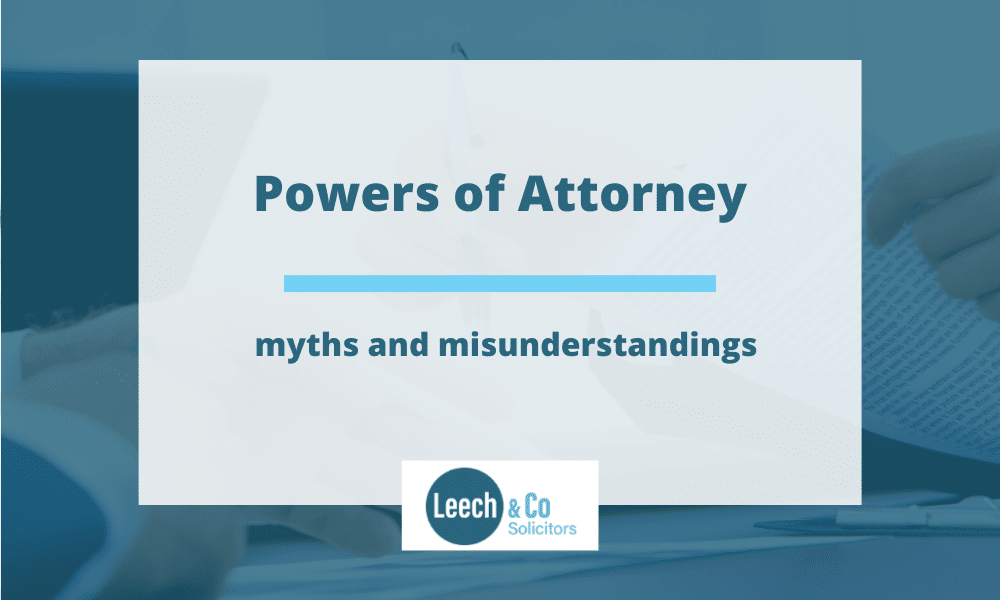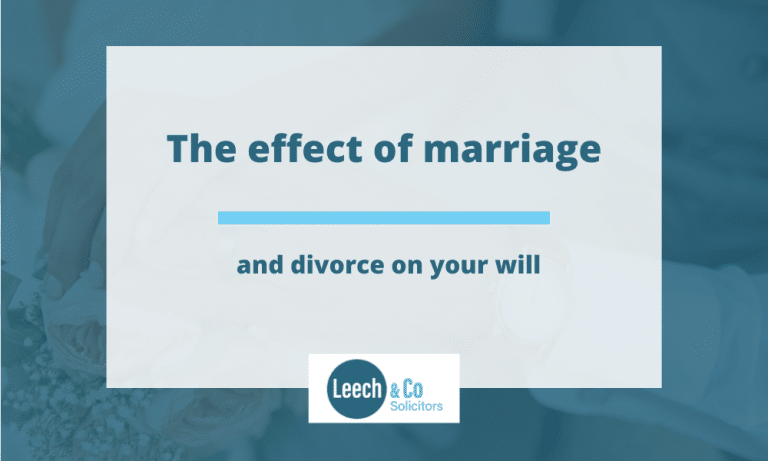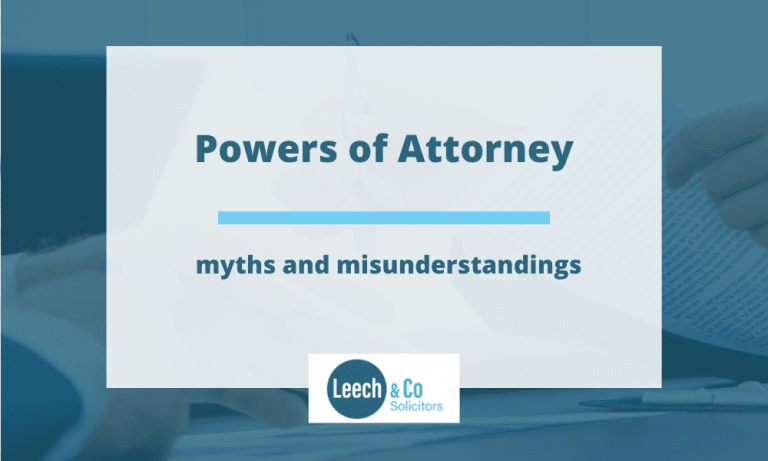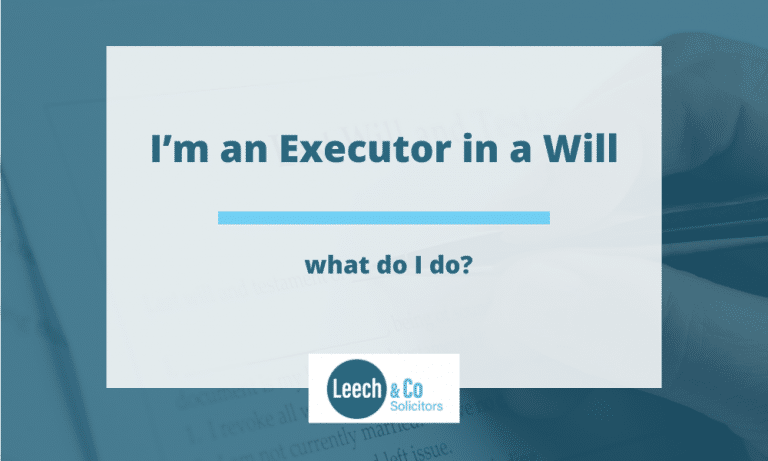More and more people these days are putting in place Powers of Attorney to protect themselves and their family should they be unable in the future to make their own decisions as a result of ill health i.e. following an accident, long-term illness, stroke, dementia etc. For an explanation of Powers of Attorney (what they are for, how and when they can be used and how they can help you), here’s the link to the page on our website: https://www.leechandco.co.uk/lasting-powers-of-attorney/
We talk to all our clients about Powers of Attorney and recommend to them that they are put in place as early as possible. Powers of Attorney are really a form of insurance that will protect you and your family in certain circumstances. Like any insurance policy, you put them in place and hope you never need them. However, if you need them as a result of ill health in the future, but don’t have them, you and your family will face an even more difficult and worrying situation which can impact you and your family in practical, legal and financial ways.
As we talk to our clients about Powers of Attorney, we have found that some people are very keen, but others are a bit suspicious and a bit worried about putting them in place. This suspicion and worry seems to come from some myths and common misunderstandings about Powers of Attorney. In this article we’ll discuss the most common ones and put the record straight. Hopefully, this will help people make an informed decision about Powers of Attorney and encourage them to put them in place.
“Powers of Attorney are too expensive”
This is the most common comment we receive about Powers of Attorney. It’s true there is a cost involved with Powers of Attorney. Generally, a solicitor will charge a fixed fee to draft and arrange the registration of the documents and there is also a registration fee of £82.00 per Power of Attorney. These are one-off payments that ensure the Powers of Attorney are in place and ready should you ever need them.
However, this one-off cost needs to be balanced against the costs and fees if you don’t have Powers of Attorney, but need them in the future as a result of ill health. In this situation, in order to make any decisions or take any actions for you, your family will have to apply to the Court of Protection to be appointed as your Deputy. This is a long, complex process and it will be far more expensive in terms of legal fees than the fixed fee charged for putting in place the Powers of Attorney.
We firmly believe that it’s much better, safer and cheaper for you and your family to put in place Powers of Attorney as early as possible than to take the risk of not putting them in place and having to apply to the Court of Protection.
“My wife / husband / next of kin will be able to make decisions for me if I become ill”
This isn’t true unfortunately. If you don’t have the mental capacity to make your own decisions, nobody has the legal right to act on your behalf in relation to your financial, property or healthcare decisions unless they have been granted the legal authority to do so by a Power of Attorney. This includes your wife / husband / next of kin.
“I have a joint bank account so I don’t need Powers of Attorney”
Again this also isn’t true. If you have a joint bank account and one of you loses capacity, there is no guarantee that your husband / wife / partner will be able to access the joint account to make payments for bills, the mortgage, expenses etc. Your bank is entitled to stop access to the joint account if one of you loses capacity until a copy of the Power of Attorney document has been provided to them. If Powers of Attorney have not been put in place by the time one of you loses capacity, it is too late to put them in place and access to the account may be denied by the bank.
If you have Powers of Attorney in place, your Attorney can access the bank account and ensure all payments are made.
“I have a Will so my Executor will be able to help me if I become ill”
A Will is an entirely separate document to the Powers of Attorney. A Will is only for when you pass away, a Power of Attorney is only for when you are alive. Your Executors and Attorneys may be the same people, but they are entirely different roles. Executors have no authority to act on your behalf in any situation while you are still alive. The only way to appoint someone to assist you while you are alive with financial, property and healthcare decisions is by putting in place Powers of Attorney and appointing an Attorney.
“I’m not ill at the moment so I’ll wait to see if I get ill before I put the Powers of Attorney in place”
This is risky and we would not advise you to do this. Your Powers of Attorney can only be put in place by you. You must appoint your own Attorneys and you must have mental capacity to do this. If you wait until you’re unwell and you actually need the Powers of Attorney, it may be too late for you to put them in place. Your family will then have to apply to the Court of Protection to make decisions on your behalf.
“I don’t want to put in place Powers of Attorney because I don’t want to lose control over my finances or health decisions while I still have capacity to make my own decisions”
This is a common worry for people in relation to Powers of Attorney. A Property and Finance Power of Attorney can become active to allow your Attorneys to assist you with financial and property matters while you still have mental capacity. However, it cannot be used without your consent so you will still have control over your financial and property decisions.
A Health and Welfare Power of Attorney can only become active if and when you lose mental capacity to make your own decisions and cannot be used while you have mental capacity.
We tell our clients who are worried about losing control of their affairs that the only way to keep control is by putting in place Powers of Attorney. This is because, should you become unwell, it is your appointed Attorneys making decisions for you in your best interests and in the way that you have directed them to do. Without Powers of Attorney, those decisions will be made by a court and/or someone you haven’t appointed to act for you.
We hope this article has cleared up some myths and misunderstandings about Powers of Attorney, but if you would like to discuss this further please contact us on 0161 749 9000 or via the website for a free, initial informal chat. We offer home appointments and fixed fees as standard.




